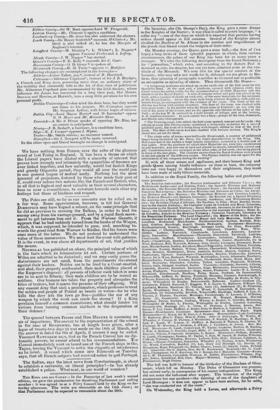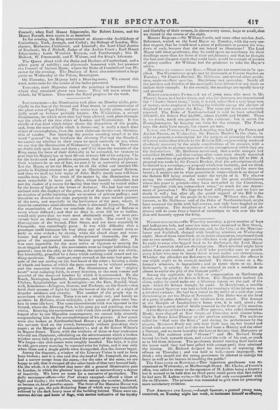THE KING AND ins COURT.— In the Postscript of last
week's second edition, we gave the proclamation for dissolving Parliament and calling another : it was agreed to at a Privy Council held by the King on Sa- turday afternoon. The writs are returnable on the 14th June ; so that Parliament may be expected to reassemble about the 20th. On Saturday, also (St. George's Day), the King gave a state dinner to the Knights of the Garter; it was what is called in court language, " a collar day "—one of the days on which it is expected that persons having orders should appear in full costume. Several of the Knights almost rivalled the Duchess of St. Albans in the number and magnificence of the jewels that blazed round the insignia of their order.
On Monday evening, the Queen gave a state hall,—the first of (we hope) a long series of those splendid pageants to which, from various circumstances, the palace of our King has been for so many years a stranger. We take the following description from the Court Newsman ; for " journalism," which rules, and according to Sir Robert Peel is destined to ruin the empire, has not yet been admitted even to the yes- tibule of the Alonarch. We note this for the special comfort of the baronet ; who may take our words for it, although we are given to Re- form, that spinning of paragraphs is neither so favoured nor so profitable an occupation as spinning of cotton. Thus discourseth Mr. Doane- " A temporary orchestra was fitted up on the south side of the Ball-room for the Quadrille Band. At the east end, a platform, covered with crimson cloth, was raised across the entire width, for the accommodation of their Majesties and the members of the Royal Family. A sofa of crimson velvet and gold was placed at the back, with a number of chairs on each side, of the same materials, for the members of the Royal Family. Above the seats were hung crimson draperies, with gold-co- loured fringe, to correspond with the curtains of the coon. The front of the or- chestra was hung with similar draperies. The floor of the room was chalked with very great taste ; in the middle were the Royal arms of England ; on one side the star of the order of the Garter, and on the opposite side the star of the order of the Bath ; at the top W. R. enclosed in a bold wreath of foliage, and at the bottom' A. It. similarlyenclosed. At each corner was a harp ; groups of the rose, shamrock, and thistle were interspersed.
" The Drawing-room, into which the Ball-room opened, was set out for cards : the adjoining-room (the Throne-room; contained a temporary orchestra for a secord quadrille party, the front of it being hung with drapery similar to that of the Bull- room. The floor of this room was also chalked with various devices. The King's closet was set out for cards.
" The whole suite of rooms were brilliantly illuminated, a number of additional lamps being furnished by Mr. Perry, the lustre manufacturer to the King. The Ball-room had in the middle a large ormolu chandelier, containing a double row of wax lights. Over the platform on which their Majesties sat, were two candelabras on gilt branches, and also one at each end placed on stands, beautifully carved and gilt. Candelabra were also arranged at the other sides of the room, two being placed in front of the pier.glass. The choicest exotics from the Royal Gardens were placed in the fire-places of the different rooms. 'the Picture Gallery was set apart for the refreshment of the company during the evening."
If, with all these means and appliances, and their honest King and gentle Queen raining kindly influence on them to boot, the company were not very happy in themselves and their neighbours, they must have been made of sadly bilious materials.
In addition to the Royal Family, the following ladies and gentlemen were 'present— The Austrian Ambassador ; the Russian Ambassador and Princess Lieven ; the Netherlands Ambassador and Madame Feick ; the Spanish Minister and Madame Bernindez ; the Prussian Minister and Baroness Billow; the Swedish Minister and Countess Bjornstjevna ; the Bavarian Minister and Baroness de Cetto; the Ameri- can Minister and Mrs. Maclane ; the Neapolitan Minister and Countess Ludolf ; the Mexican Minister and Madame Gorostiza ; the Russian (on a Special Mission), the Austrian (on a Special Mission) ; Danish, Sardinian, and Wirtemburg Minis. ters; the Brazilian Chargé d'Affaires; the Duchess de Dino ; Mons. Bourke, secre- tary to the Danish Embassy ; the Chevalier Lopez de Cordoba and Mons. Courtoys,. Secretaries to the Spanish Embassy ; Baron Ralamb, Secretary to the Swedish Ern— bass), ; the Chevalier de Neumann, Counsellor to the Austrian Embassy ; Mons. E.. de Gorostiza, Attache to the Mexican Embassy ; Chevalier Vanvieelli, Secretary, to the Neapolitan Embassy. The Lord Chancellor; the Master of the Rolls; the At- torney-General to the Queen ; the Lord Mayor and Lady Mayoress. Dukes—De- vonshire, Richmond, Manchester, Northumberland, Gordon, Norfolk, Rut- land, Grafton, Buceleugh, Argyll, Dorset, Newcastle. Duchesses—Montrose, Northumberland, Gordon, Buceleugh, Dowager Leeds, De Dino, Newcastle. Marquises — cholmoudeiey, Thomond, Salisbury, Camden, Bute, Win-. chester, Lothian, Tavistock, ClanrIcarde, Lansdown, Abercorn, London- derry, Downshlre. MarchionessesThomond, Downshire, Tavistock, Lothian,. Clanricarde, Stafford, Winchester, Londonderry, Salisbury, Hastings, Bute. Earls—Clanwilliam, Bandon, Tankerville, Uxbridge, Gower, Hardwicke, Be in Warr, Bathurst, Fife, Warwick, Romney, Grey. Jersey, Liverpool, Albemarle, Rose- bery, Mountcharles, Dudley, Aberdeen, Mount Edgeumbe, Gosford, Talbot, Verulam, Grosvenor, Euston, Radnor, Wilton, Sefton, Chesterfield, Westmoreland, Errol, Howe, Itosslyn, Haddington, Mayo, Amherst, Belfast, Aboyne, Caledon, Surry,, Shaftesbury, Spencer. Countesses—Clanwilliam, Bandon, Tankerville, Listowel, Gower, De la Warr, Bathurst, Warwick, Huntingdon, Jersey, Albemarle, Rosebery, Mountcharles, Verulam, Euston, Radnor, chesterfield, Howe, Errol, Mayo, Am- herst, Harrowby, Clarendon, Caledon, Talbot, Lonsdale, Plymouth, Wicklow, Sefton. Salts, Glengall, Guilford, Roden. Viscounts—Encombe, Barnard, Althorp, Goderich, Howick, Beresford, Atcheson, Gage, Melbourne, Duncannon, Sydney,_ Anson, Fiteharris. Viscountesses—Gage, Anson, Fitzharris. Lords—F. L. Gower, Auckland, Ellenborough, Prudhoe. Foley, Byron, Durham, De Dunstanville, Wharncliffe, Suffield, St. Helens, Teynham Montagu, Carteret, Farnborough, J. O'Bryen, Glenlyon, Manners, Hill, Paulet, donson, Willoughby de Broke, G. Sey- mour, Willoughby de Eresby, Ravensworth, Belhaven. Ladies—Graham (2), Dalrymple, Harriet Barnard, C. Buggins, F. L. Gower, G. Bathurst, O'Bryen (2),. Auckland, Martin, Marsham (3), Tierney, Grey (2), Jenkinson (3), H. Primrose, Byron, Wrottesley, Peel, A. Byng, C. Wood, C. Cavendish, B. Cavendish, G. Cavendish, De Dunstanville, Burdett, Wharncliffe, Hardinge, Suffield, F. Ley, G. Thynne, J. Thynne, Teynham, Montagu, Farnborough, S. Lennox, J. O'Bryen, Ryder (3), Freemantle, Glenlyon, Manners, H. Keppel, Houston, Harriet Hamilton, Paulet, Durham, Graham, Wynne, A. Becket, C. Greville, Molyneux, Willoughby de Broke, L. Fitzroy, Willoughby de Eresby, Caroline Lascelles, Itavensworth, Hastings (2), L. Clive, C. Denison, J. Stanley, Anson, Bel- haven, F. Ley, Cotes, Shiffner, A. Duller, Grey de Ruthyn, S. Ingestrie, C. St. Maur. Barons—Munchausen, Linsingen. Baronesses—Grey de Ruthyn, Feick. Right Honourables—C. Grant, Sir R. Peel, C.J. Stanley. Honourables—Lady Cockburn, W. Bathurst, Bliss C. Foley, Miss G. Foley. Sirs—A. Dalrymple, W. Waller, H. Wheatley. J. Conroy, M. Tierney, J. Wrottesley, F. Burdett, H. Hardinge, H. Hal- ford, F. Lamb, W. Gomm, G. Shiffner, A. Barnard, F. Watson, R. Chester, W. Freeman, \V. Houston, J. Graham, A. d'Este, J. Cockburn, G. Anson. Rev. Mr. Jeff. Messieurs—G. Lamb, Greenwood, W. Taylor, Seymour, Bankes, FL Bankes, C. Pole. J. Hudson. C. Greville, Capel, Mills, C. Cavendish, Lascelles, Stanhope Dawsor, Villiers, Fazgerald, Grimston, L. Gower. Blistresses--Pelham, Roberts, G. Lamb, Champagne, Bankes, W. Taylor, C. Pole, W. Smyth, H. Baillie, Webster, Clifford, Williams, Whatley, Howley. Lefevre, Ellis, Mills, Dawson, Cuthbert, L. Gower.—Misses—Cockburn, Gorostiza, Wheatley (2), Tierney, Anson, Wrottesley (2), Wood, Cavendish, Burdett (2), Ley, Mary Ley Montagu (2), Howley (2), Brougham, Hope, Fitzgerald (2), Buller, Graves, Anson (2), Smyth, Cotes, Pelham (2). Admirals—Sir G. Martin, Hon. Sir H. Blackwood. Generals—Sir G. Cock- burn, Champagne, Sir E. Kerrison, Sir J. Kempt, Sir J. Malcolm. Colonels—Keate, Sir C. W. Thornton, Cavendish, Wemyss, H. Bantle, Fitzclarence, Whatley, Hig- gins, Poten, Arbuthnot, Hill, Gust. Major—Webster. Captains—Byng, Clifford, Fitzclarence, Hugh Fitzroy.
The ball was held in honour of the birth-day of the Duchess of Glou- cester, which fell on Monday. The Duke of GlOucester was present, but retired early, in consequence of his recent indisposition. The King did not enter the ball-room after supper. The historian of the night enumerates but one accident—the fainting of one of the daughters-of Lord Montague : it does not appear to have been serious, for he adds,.
"she was conducted out of the room."
On Wednesday, the King held a Levee, and afterwards a Privy.
Council ; when Earl Mount Edgecumbe, Sir Robert Liston, and Sir -Henry Parnell, were sworn in as members.
In the evening, the King entertained at dinner—the Archbishops of Canterbury, York, Armagh, and Cashel ; the Bishops of London, Win- chester, Rochester, Chichester, and Llandaff; the Lord Chief Justice of England ; Sir J. Nicholl, iudge of the Arches Court ; Earl Mount Edgecumbe; Lords Wynford, Kenyon, and Farnborough ; Sirs H. Halford, W. Freemantle, and F. Watson, and the King's Advocate.
The Queen dined with the Duke and Duchess of Cumberland, and a select party of nobility; and afterwards honoured with her presence the Concert of Ancient Music, where the Duke of Cumberland was Di- rector for the evening. The Duchess of Kent also entertained a large party on Wednesday at the Palace, Kensington.
On Thursday, her Majesty held a Drawing-room. We cannot this week make room for the names of the ladies presented.
Yesterday, their Majesties visited the paintings at Somerset House, where they remained above twa hours. They left town about five o'clock, for Windsor. Thus ends the Royal progress for the week.




























 Previous page
Previous page